How to Fix 'The semaphore timeout period has expired'
This article provides three solutions to this problem 'The semaphore timeout period has expired. The table below gives an outline. Read the content for details.
| Workable Solutions | Step-by-step Troubleshooting |
|---|---|
| Fix 1. Disable firewalls and anti-virus | In Windows 10/8.1/8/7, press "Windows + R" keys to bring up the "Run" box, input control to open...Full steps |
| Fix 2. Perform a clean boot | Press "Windows + R" hotkeys to bring up the "Run" box, input msconfig to open System Configuration...Full steps |
| Fix 3. Convert FAT32 to NTFS | You can convert FAT32 to NTFS to break the file size limit. The file system conversion is very simple...Full steps |
What's the 'semaphore timeout period has expired' error
'The semaphore timeout period has expired' error occurs in many situations in different forms in Windows 10, 8, or 7, and the most commonly seen ones are in the following.
[1] When you're trying to transfer or copy large files over a network, you got the full error message as "Error 0x80070079: The semaphore timeout period has expired"
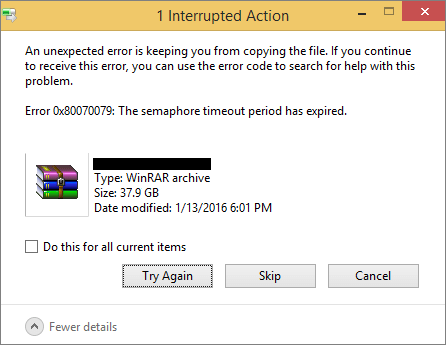
[2] You're attempting to open a portable drive, for example, an external USB hard drive that is correctly connected to a computer, the access failed due to the error "Location is not accessible, the semaphore timeout period has expired."
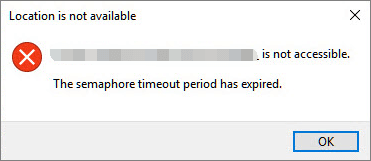
People might get the kind of system error when they try to transfer files, particularly large files, between their Windows system and any other external device, or when they try to access a certain driver connected to their computer. This error will prevent people from accessing the current drive or completing the transfer process. In conclusion, the 'semaphore' related problem is arousing within the local network, between the computer and an external driver, or simply the file transfer limit on your portable drive.
Fix 'The semaphore timeout period has expired'
Since it's about the network driver, external driver, or file transfer limit associated problem, the corresponding fixes should be the four. By listing from simple to complex, they are:
- Disable Firewalls and anti-virus software (Temporarily)
- Perform a clean boot
- Convert FAT32 to NTFS
- Update drivers of network adapters
Fix 1. Disable Firewalls and anti-virus software
Reason: Windows Firewall or anti-virus software sometimes blocks a certain file transfer without a prompt, by disabling the security protection would resume your actions.
Step 1: In Windows 10/8.1/8/7, press "Windows + R" hotkeys to bring up the "Run" box, input control to open Control Panel.

Step 2: In the Control Panel, type firewall in the search, and click the "Windows Firewall" in the results.
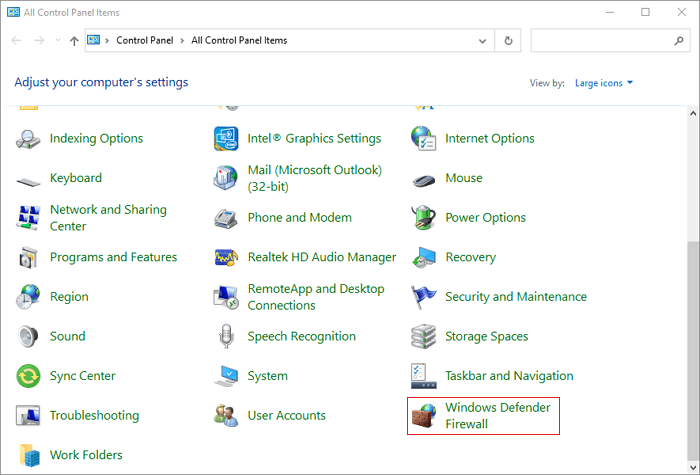
Step 3: On the left pane, click "Turn Windows Firewall on or off".
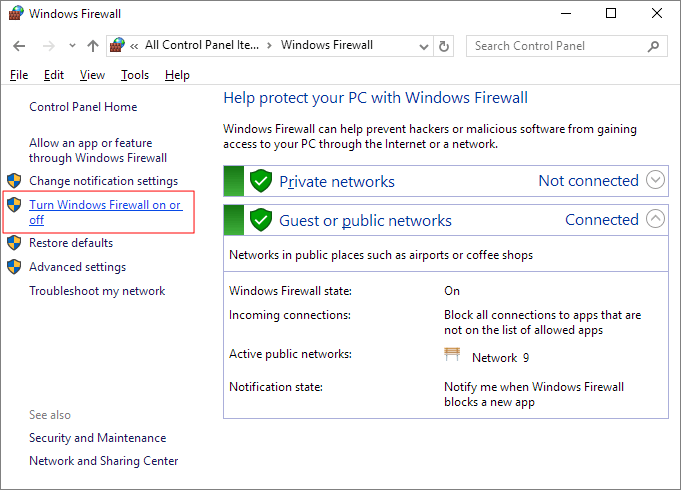
Step 4: Click "Turn off Windows firewall (not recommended)" under both private and public network settings. Click "OK".
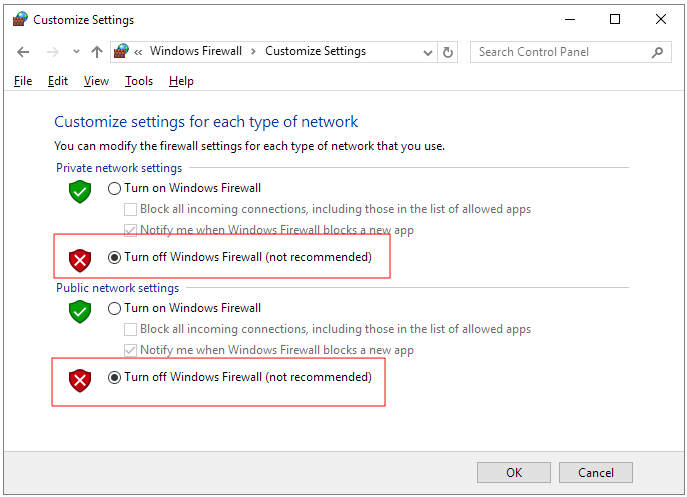
This is the overall guide for all Windows users to disable Windows firewall that blocks the file transfer process and sends the semaphore error. After turning off the firewall, retry copying files. If the error's gone, you can go back to turn on the firewall again.
For anti-virus software, people are using different products, but the process is merely the same by going to Settings, and there is the option to turn off the protection mechanism.
Fix 2. Perform a clean boot
Reason: Exclude the file or program confliction that causes 'the semaphore timeout period has expired'.
Step 1: In Windows 10/8.1/8/7, press "Windows + R" hotkeys to bring up the "Run" box, input msconfig to open System Configuration.
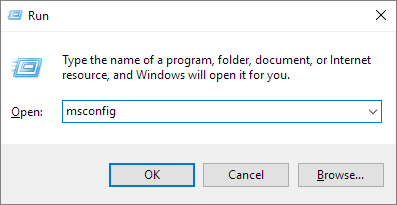
Step 2: Switch from the default General tab to "Services", tick the box "Hide all Microsoft Services". Click "OK".

You'll need to restart your computer in a clean boot then. Now try to transfer files again. Hope this time you can make it without trouble.
Fix 3: Convert FAT32 to NTFS
Reason: FAT 32 has a file transfer limit, you cannot transfer a single file over 4GB, while the NTFS file system is with no problem in transferring huge files.
You need to convert FAT32 to NTFS to break the file size limit. To file system conversion is very simple in Windows via disk formatting, but this will result in total data loss.
We recommend the other safe way to convert FAT32 to NTFS without losing data, by using third-party free partition manager software.
Fix 4: Update drivers of network adapters
Reason: outdated network adapters driver is responsible for most network file transfer problems, and 'the semaphore timeout period has expired' is the commonplace one.
Step 1: In Windows 10/8.1/8/7, press "Windows + R" hotkeys to bring up the "Run" box, input devmgmt.msc and hit Enter.

Step 2: In Device Manager, expand Network adapters, and right-click on the network driver and choose "Update driver software".
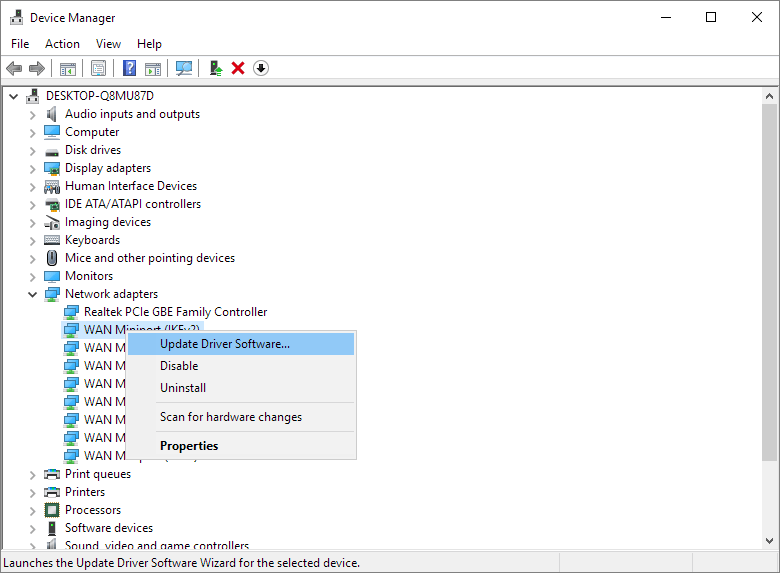
Step 3: When prompted, choose "Search automatically for updated driver software" and click "OK".
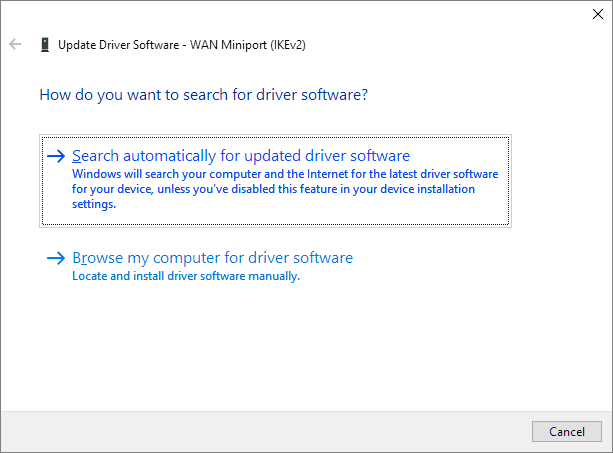
Restart your system once the latest driver is installed.
How to protect data from 'The semaphore timeout period has expired' error
Data is always concerned in various hard drive/network drive issues, and do not look down upon the semaphore error even if there are fixes available.
Back up hard drive
Backup plays a significant role in the operating system and data protection, but it should be put on the top task. Otherwise, it's just an empty talk when the system crashed, the hard drive formatted, or a whole partition disappeared. Windows offers Backup and Recovery in Windows 7, and File History in Windows 10 to back up hard drive data for free. You should make full use of it.
Third-party free backup software, like Qiling Backup, is also a good choice, the worldwide users choose it over the Windows built-in programs due to its versatility in all backup purposes, including system backup, hard drive/partition backup, file backup, etc. And, you can schedule a backup task daily, weekly, or monthly.
Recover hard drive data for Free
What if the semaphore error has caused data loss, or data inaccessible? Still, you can make efforts to rescue data there. Qiling hard disk data recovery software is able to recover data from an inaccessible hard drive that reports all kinds of errors, including the 'semaphore timeout period has expired, 'invalid raw file system', 'hard drive needs formatting', and so on before you can use it.
Step 1. Select file types and click "Next" to start
Open Deep Data Recovery. Select file types and click "Next" to start.

Step 2. Scan the hard drive partition
Select the drive on your hard disk where you lost or deleted files. Click "Scan" and let Qiling data recovery software scan for all lost data and files on the selected drive.

Step 3. Check the results
When the scan completes, you can apply the "Filter" feature or click the "Search files or folders" option to find the lost files on the hard drive.

Step 4. Restore lost hard drive data
Select wanted files that you lost on the drive and click "Recover" to save them to another location.
Related Articles
- Fix Micro SD Card Not Detected in PC, Android Mobile Phone or 3DS
- Recover Data from Encrypted (EFS) Hard Drive Partition in Windows
- Free Fix Hard Drive Partition Shows 0 Bytes Error in Windows 11/10/8/7
- Kingston Flash Drive Recovery